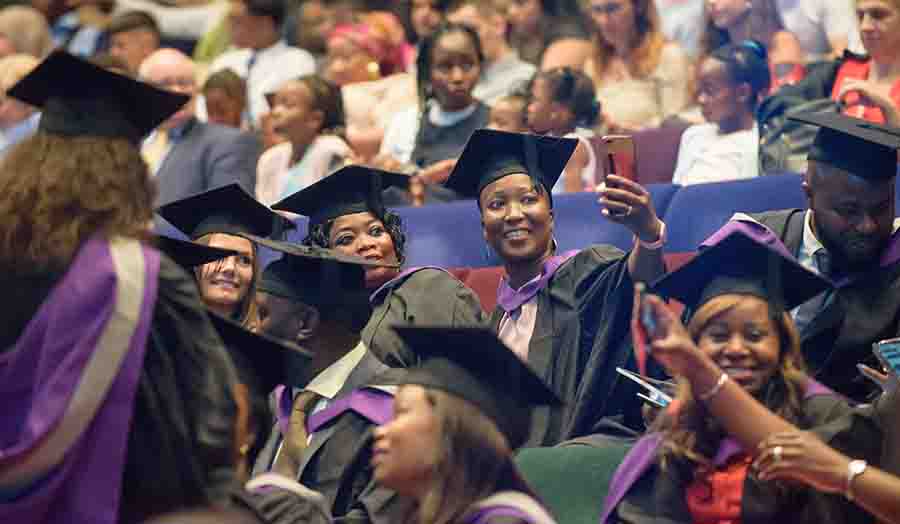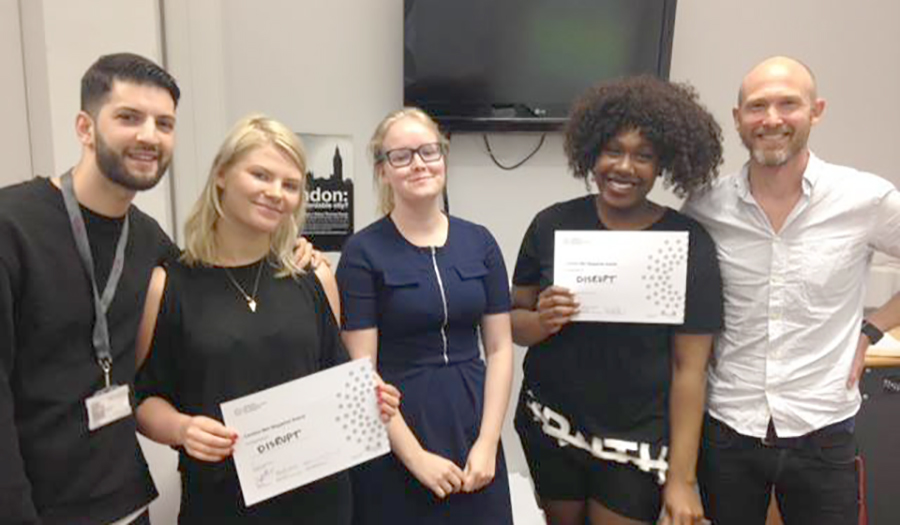Apply for this course
Please select when you would like to start:
Use the apply button to begin your application.
Non-EU applicants looking to study part-time should apply direct to the University. If you require a Tier 4 visa and wish to study a postgraduate course on a part-time basis, please read our how to apply information for international students to ensure you have all the details you need about the application process.
Why study this course?
This master's degree is designed for teachers and language professionals to learn how to teach the English language. The course is also suitable if you don't have any teaching experience.
We have a divese cohort so you'll benefit from a varied learning experience. You'll explore new theories and conversation around language, teaching languages and learning in various social and educational environments.
Learn about teaching in a variety of contexts
You'll explore new theories and conversation around language, teaching languages and learning in various social and educational environments
Learn about all the major aspects of teaching
Explore language pedagogy, linguistics and sociolinguistics in relation to theory and practice on this course
Learn from industry professionals
Our teaching team are experienced practitioners who have published work and research in the sector
Course modules
The modules listed below are for the academic year 2025/26 and represent the course modules at this time. Modules and module details (including, but not limited to, location and time) are subject to change over time.
Year modules
Issues in Language Learning: An Intercultural Approach
This module currently runs:autumn semester - Tuesday morning
(core, 20 credits)
This module focuses on key issues in language learning and teaching that are relevant to contemporary classroom practice. You will explore how pedagogical thinking has developed in different cultural contexts and how this influences language teaching and learning in particular.
This module aims to extend your knowledge of cultural differences in the creation of methodologies and approaches in language teaching and learning; the different cultural status of teachers; the role of the learner and their languages in their learning process; and more specific considerations of curriculum, syllabus and teaching materials in the teaching of global languages in local classrooms.
The module also promotes the problematisation of key concepts in language teaching and learning, such as ‘culture’, ‘language’, and ‘identity’ and you will be encouraged to reflect on your own experiences as a learner and/or teacher in order to evaluate your own knowledge and expertise and develop an analytical, critical and global perspective to the teaching of languages that is essential for your professional development.
In this module, you will:
- explore the relationship between language and culture in the teaching of global languages
- examine how language teaching methodologies are influenced by different understandings of language, culture, and learning
- reflect on the role that culture plays in communication, particularly in multicultural contexts
- study how language teaching curricula, methodologies, and materials can impact the identity construction of language learners
Language Testing and Assessment
This module currently runs:spring semester - Wednesday morning
(core, 20 credits)
This module examines the core concepts and main theoretical approaches to language testing and assessment. The module encourages students to evaluate their own experiences of language testing and assessment practices in a reflective manner and to examine the most widely used standardised tests from a critical perspective. The module encourages students to discuss common debates in the field of language testing and assessment and analyse English language tests in terms of their practicality, reliability, validity and authenticity.
Evaluating and examining local and international language tests will allow students to become familiar with the different types, purposes, and objectives of language tests. The module also offers opportunities to design and develop English language tests that can be potentially useful in the students’ future teaching practice.
In this module, you will:
- Analyse, and evaluate the main theoretical issues and current debates on matters of testing English as a second/foreign language
- Relate current theories and debates to your own national/professional language testing situation and everyday practices
- critically analyse language tests and their application in local and global contexts, including your own
- develop language tests that are appropriate, relevant, and suitable for your teaching and assessment context
Linguistics and Language Teaching: the Description of Language and its Pedagogic Applications
This module currently runs:autumn semester - Wednesday afternoon
(core, 20 credits)
This module is intended to familiarise – or refamiliarise – you with key areas of linguistic analysis such as typology, phonology, morphology, syntax, semantics, pragmatics and corpus linguistics. The areas are introduced contrastively, and you will be invited to compare with equivalent phenomena in your or your students’ languages, including cultural differences in realising speech acts. The module makes reference to different language teaching approaches and their very different stances on the usefulness (or lack thereof) of explicit teacher and student knowledge of linguistics. You will develop an in-depth understanding of how knowledge of the different make-ups of languages allows you to predict problems encountered by your students in learning English. You will have the opportunity to develop learning and teaching resources which will address particular problems of your students that derive from contrasts between your students’ first or main language(s) and English. You will also be invited to reflect critically on the language teaching choices in your particular institutional context, on the expectations of your students, and on your journey as a language teacher.
In this module, you will
- raise your language awareness
- deepen your understanding of the make-up of English
- contrast English with your and/or your students’ first or main language(s)
- develop tools to investigate the make-up of languages
- reflect on your language teaching approaches and develop learning and teaching materials that address selected problems caused by the structure of your students’ first or main language(s)
- reflect on the extent to which knowledge of linguistics can help language teachers to gain a better understanding of their students’ learning and to help them in their teaching
Patterns in Global Sociolinguistics
This module currently runs:autumn semester - Wednesday morning
(core, 20 credits)
This module is designed to equip students with a critical and informed understanding of the complex ways in which language and languages are configured in societies around the world. The module will encourage students to think critically about the sociolinguistic patterns of their own context and speech community, and to reflect upon the influence of historical, ideological, and political factors in the development of these patterns. The module will also help students develop the necessary skills to become active sociolinguistic observers and researchers in order to identify, explore, and discuss patterns and principles which underlie language use, language choice, language planning, language attitudes, and language policy. By doing so, students will also familiarise themselves with the core terminology and theoretical frameworks of sociolinguistics. Finally, students will be expected to take a critical and informed view of issues surrounding the use and teaching of English worldwide and investigate matters of language and language education in a number of contexts in order to develop responses to current language-related problems.
In this module, you will:
- Explore the relationship between language and society and its influence on English language teaching theory and practice
- Examine the role that the spread and distribution of English has in educational and governmental language planning and policy
- Develop a critical understanding of the ideological underpinnings of the spread of English
- Evaluate the extent to which different theoretical and applied aspects of sociolinguistics can influence English language curricula and teaching practices
Teaching Languages Dissertation
This module currently runs:summer studies - Tuesday morning
spring semester - Tuesday morning
(core, 60 credits)
This module combines a taught module and a supervised research project. During the spring term, you will explore a range of approaches, methods and traditions in research in Applied Linguistics. You will study competing and complementary research paradigms found in the field and their corresponding approaches to research design. You will examine the opportunities and challenges that quantitative approaches offer as well as issues of validity, reliability, and sampling. Similarly, you will be introduced to a wide range of qualitative approaches to research in language and language teaching.
You will also discuss issues surrounding the use of questionnaires as research tools and the uses of interviewing and observations. You will also investigate current approaches, issues and debates in classroom research, with a particular focus on Action Research.
In this module you will also be encouraged to explore issues and current approaches to collecting and analysing naturalistic language data as well as, more broadly, communication research.
The ultimate aim of this module is to prepare you for the Dissertation project that follows by giving you a solid grounding in both current research methodology in language teaching and Applied Linguistics and the theoretical paradigms from which they arise and to understand, identify and evaluate different research methodologies.
The second part of the module involves a supervised but independent research study leading to a 12,000 dissertation. You will have the chance to explore a disciplinary topic that is of your particular interest or relevance to your context. You will be able to conduct classroom research on aspects of English or Arabic language teaching and learning, or can choose other relevant themes such as sociolinguistics, linguistics, language testing, or intercultural communication, among others. You will be encouraged to draw on different data collection methodologies and use relevant paradigms in analysing your data.
In this module, you will:
- pursue an area of personal disciplinary interest in a way that demands rigorous analytical and critical thinking and encourages you to push your own personal and professional boundaries
- formulate relevant and original questions, undertake research that addresses them, and provide persuasive and academically sustainable arguments to support them
- develop your ability to critically review and make use of an extensive and appropriate bibliography in your own work
- expand your understanding of the relationship between research, theory, practice and ‘real world’ problems
- develop your independence as a self-directed and self-motivated professional in problem-posing and problem-solving through designing, undertaking, and writing about your own research.
The Multilingual Classroom
This module currently runs:autumn semester - Tuesday afternoon
(core, 20 credits)
This module provides students with an overview of current issues in multilingualism with a specific focus on its impact on classroom teaching and learning. It aims to develop a critical understanding of key theoretical frameworks, while inviting students to reflect on their own personal experiences to consider the practical implications of linguistic diversity in educational contexts. Students will increase their awareness of learning environments where learners and/or educators do not have full and equal access to the language(s) of instruction, allowing them a deeper understanding of their future multilingual pupils.
The two-part assessment will provide an opportunity for students to use their creativity, alongside newly developed theoretical understandings, to design a subject-specific lesson plan for an hour-long class in a multilingual setting. The plan will be put into action through a 15 to 20-minute micro teaching session focused on one specific activity. Fellow classmates will become the ‘students,’ with peer evaluations forming part of the micro teaching mark, strengthening students’ skills in critical evaluation of classroom activities in multilingual environments. In doing so, students will deepen and develop their own teaching practices.
The module is targeted at students working or planning to work in multilingual, educational contexts and will be particularly attractive to those interested in teaching languages. However, the increasing prevalence of linguistic diversity in the majority of educational contexts means educators with any specialisation will benefit from being prepared to work with multilingual students and learning to value and draw on their diversity of knowledge and experiences.
Module Aims:
- You will reflect on and experience teaching and learning in contexts where students and/or teachers do not have full and equal access to the language(s) of instruction
- You will explore different perspectives on multilingualism and their implications for teaching and learning
- You will integrate practical theories of multilingualism into the planning, design, and implementation of subject-specific lessons in multilingual contexts
- You will broaden your understanding of the concept of multilingualism through an interdisciplinary consideration of current debates, discussions, and developments
Understanding the Language Classroom
This module currently runs:spring semester - Tuesday afternoon
(core, 20 credits)
This module offers an investigation into the language classroom and into learner and teacher roles and interactions. It develops themes relating to how languages are learned, what motivates people to learn languages, and how best to support and develop learning in the classroom. The module draws on students' own experiences of language learning and/or teaching and encourages them to reflect on theoretical and practical aspects of language learning, while the developing their own practice as language teachers.
Through language classroom observations, students will become familiar with common practices in language teaching and learning and develop a teacher-researcher perspective. The module introduces a range of theoretical and practical considerations of recent developments regarding the language classroom, including theoretical debates that widen students’ understanding of language learning and teaching. The practical implications of these debates on classroom teaching and learning will be considered. In doing so, the students have the opportunity to evaluate and analyse learners and in classroom settings, incorporating lived experiences with academic literature.
Importantly, students are required to find an institution where they can observe at least two hours of English language tuition at any level.
Module Aims:
You will
- become familiar with common practices in language teaching and learning and investigate how different cultural, social, and psychological factors influence learning
- undertake research on teaching and learning
- critically analyse recent theoretical developments in language teaching
- consider the practical classroom implications of these theories
- analyse learners' needs and identify classroom solutions while observing students in a classroom setting
- identify a range of techniques for promoting learning in the classroom



.JPG)
















